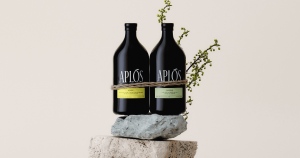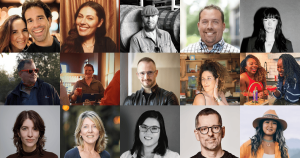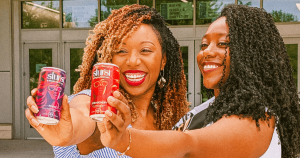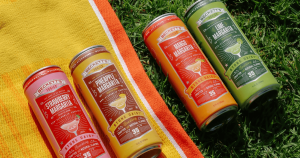The following was written by Anne Kadet and published in the Wall Street Journal on 12/1/20.
Just in time for the holidays—it’s New York City’s first zero-proof liquor store. Or as owner Douglas Watters has it, “booze-free bottle shop.” It’s a store stocked with fancy drinks that won’t get you drunk.
“A lot of people come in and are confused about what in the world is this, and why would I want this?” Mr. Watters said when I met him at Spirited Away, the Lower East Side storefront he opened mid-November.
Others thank him and say, “I’ve been looking for this for so long. I want one of everything!”
And you could conceivably buy one of everything in this spare store, which stocks about 80 varieties of alcohol-free beer, spirits, aperitifs, mixers and “leisure sodas.” The zero-proof craft beverage space—characterized by its complex, often bitter concoctions meant to serve as satisfying substitutes for an alcoholic cocktail—is new and tiny.
Mr. Watters said most of the 30 brands on his store’s two racks are less than two years old. And many deliver an unexpected flavor experience.
“They’re all oysters, not Chicken McNuggets,” Mr. Watters said.
He paused to reflect. “I’m not sure that’s a good analogy.”
Many options, including the $3 spice sodas from Brooklyn’s Dona Chai, $15 six-packs of nonalcoholic beer from Athletic Brewing and $73 bottles of “spirit restorative” from Rasasvada are produced by companies based in or around New York City.
Among them are two variants from Proteau—a company based down the block from Spirited Away. Founder John deBary, who refers to himself as a “retiree of the fancy NYC cocktail scene”—he was the bar director for years with a trendsetting restaurant group—got started when he observed more patrons asking for better zero-proof options. He experimented with botanical recipes in his kitchen and launched his Ludlow Red last year, followed this summer by Rivington Spritz, both named after neighborhood streets.
The opening of Spirited Away is more proof of the growing market for zero-proof drinks as non-drinking becomes more normalized—even in booze-soaked New York City, says Mr. deBary.
“If you said you weren’t drinking five years ago, people wondered, ‘What’s the sad story behind that?’ ” he recalls. “Now people say, ‘Oh wow, good for you.’ ”
John Wiseman is an industry veteran—he launched his Hudson Valley-produced Curious Elixirs brand of booze-free cocktails (“Shaken, Not Slurred”) in 2016.
The New York bar owner got interested in zero-proof cocktails following an evening in which he gulped 20 alcoholic drinks and felt just fine the next day. “That scared the crap out of me!” he says.
When he couldn’t find anything to satisfy his thirst for a decent zero-proof cocktail, he created his own. The four varieties sell in old-school looking two-serving bottles, typically priced at $10.
“We’re coming up on our millionth cocktail sold,” he says.
During the pandemic, subscriptions to the brand’s “cocktail club” deliveries increased. And this month, Mr. Wiseman will open a “nonalcoholic elixir bar,” a dry speakeasy for subscribers. Located in a Brooklyn storefront, it will include a garden, jazz club and library stocked with books on plants and philosophy.
The pandemic has slowed the city’s growing zero-proof nightlife scene, of course. Brooklyn’s nonalcoholic Getaway bar was flourishing last winter, says co-owner Sam Thonis—sales nearly doubled after the New Year thanks to the growing “Dry January” trend, which had people snapping up the venue’s $13 “Ginger Spice” mocktails. But in May, it became a morning-hours coffee shop with a “general store” featuring zero-proof spirits, wine and beer. Mr. Thonis plans to relaunch the bar when the pandemic allows.
Listen Bar, a booze-free pop-up club based in New York City, went virtual last spring, offering online happy hours where guests learned to make alcohol-free cocktails, says founder Lorelei Bandrovschi. A $149, six-week, online “nightlife incubator” class offered this fall attracted 40 participants looking to launch their own booze-free bars and other nightlife concepts.
Meanwhile, the pandemic’s much-noted boom in home delivery booze sales has been followed by a later surge in the alcohol-free spirit deliveries, says Ms. Bandrovschi. This week, she’s opening an online store dedicated entirely to zero-proof drinks.
Indeed, the coronavirus lockdown and its aftermath seems to have spurred more interest than ever in the growing “sober curious” movement, says Hilary Sheinbaum, the New York-based author of “The Dry Challenge,” a how-to book to be released in December for those contemplating a month on the wagon.
“The pandemic increased alcohol consumption for many, and blurred the lines of when happy hour starts, too,” she says. “Now people are doing dry months to get back to a comfortable place.”
Mr. Watters, the store owner, said he’s already seeing a steady stream of shoppers ranging from a couple expecting a baby to a gallery owner stocking up on zero-proof drinks for an opening.
But Mr. Watters is really excited for the New Year, when he expects a big Dry January surge in customers eager to try the new zero-proof brands hitting the market. “Every day I have something new,” he said. “I’ll probably need to invest in some more shelves.”
Full article in the Wall Street Journal: https://www.wsj.com/articles/no-alcohol-no-problem-spirits-are-high-in-new-york-city-11606834801





